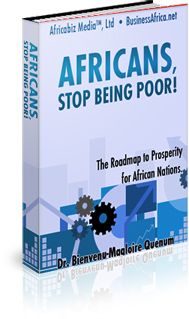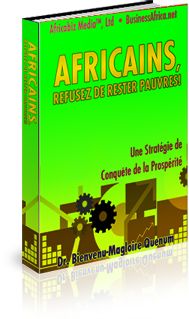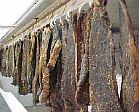|
****JavaScript based drop down DHTML menu generated by NavStudio. (OpenCube Inc. - http://www.opencube.com)****



|
| ! |
| AFRICABIZ
VOL 2 - ISSUE: 112
October
15, 2008 - January 14, 2009
Previous
Issue
Editor: Dr. Bienvenu-Magloire Quenum
Click here for contact & support console
| | A
WORD FROM THE EDITOR
| | |
|
Dear visitor and international investor,
We
warmly welcome you, if this is
your first visit to Africabiz
Online - The ultimate newsletter
on trading and investing in 49
sub-Saharan African countries.
If you are a regular and faithful
reader, welcome back.
-
THE END OF DOUBLE STANDARD: LESSONS FROM THE EVOLVING FINANCIAL CRISIS
We are witnessing the financial meltdown in all the financial places worldwide. This is an event prophesied and documented for years by investigators curious about the global plight of the humanity and the history of previous financial crisis.
One of these investigators traveled all over the world, visited elders in Africa,
Asia, Americas and Europe, and numerous historic places to search for documents
that could explain why the world is what it is: a dramatic quagmire for the majority
of the people. He gathered an outstanding collection of proofs that show these
crisis are not, first, new occurrence that happened only in the eightieth, ninetieth, twentieth
centuries, and now at the beginning of the new millennium, but had recurrently
occurred since ages. Second, that they do not result from so-called economic
cycles or are not generated by mistakes made by people working in financial institutions
(the banks, the insurance company and Exchanges,) but are the consequences of actions
taken voluntarily by a permanent secret group of people who have a hidden agenda, and are
pulling the strings.
The video available
at this link gives indications for those who are curious to know what is
going on behind the veil. It run for two hours 54 minutes, but will give you
plenty of non-mainstream explanation about what is going on. View it to know
that the "reality" we
experience everyday struggling to survive, is not the true "reality".
If you prefer "classical" explanations about the financial turmoil, you may visit
globalresearch.ca, an excellent website that exposes financing tricks used by
traders and financiers that are "apparently" responsible for the troubles.
One thing is sure:
There are winners even in the debacle. This
article by Michel Chossudovsky will give you plenty of highlight about
what is going on. (Michel Chossudovsky is the author of the very important book
titled: "The Globalization
of Poverty and the New World Order".)
And this
article by William Engdhall exposes the financial warfare ragging behind the
smoke-screen speeches and political statements made by the developed world's leaders.
Apart from that, what is interesting for developing nations to learn from the crisis, is that now the double
standard applied by the elites of developed nations towards the developing world is glaringly obvious.
Indeed, developing nations, and particularly African nations had been bombarded with propaganda since the mid 1989's to adhere to the "globalization concept" based on strict liberalism doctrine, that requires the state not to be involved in the developing process.
Based on that concept, Structural Adjustment Programs had been implemented in almost all African countries - and state's owned companies sold out to foreign powerful companies, followed by jobs's cuts and service price's increase, which result is the dramatic impoverishment of living conditions in African countries.
And now, what are we witnessing? The creators of the concept - the elites of the developed world, mainly in the United States and in the United Kingdom, struggling to stop the collapse of the financial system, are promoting the nationalization of banks, and insurance companies to save these institutions from bankruptcy. They are doing exactly the contrary of the policy imposed to developing nations since three decades - with the threatening TINA ("There is No Alternatives!) mantra. Now we know that there are alternatives.
Click here
to read about: "Eyes Wide Opened: Lessons From The Evolving
Financial Crisis
- COUNTDOWN TO THE LAUNCHING OF THE VIP
MEMBERSHIP
The VIP Members section, which launching had been announced in previous
delivery is almost ready to be fired up. The countdown had started and hopefully within
one week it will be live online.
More on the matter is available at following
link that will be the permanent
announcement page concerning VIP-Membership. Visiting said page, you will always
take notice of what is showing live on the confidential newsletter - Inside
Africa & Insights About Africa - dedicated
to VIP Members.
So, please stay tune to the free
access monthly issue of Africabiz Online to take advantage of Africabiz Online
VIP Members Lounge as soon as available.
- SERVICES
AND PRODUCTS FROM Dr. QUENUM & ASSOCIATES / BUSINESSAFRICA (TM)
List of Products and Solutions to trading and
investing in and out emerging nations - and particularly in sub-Saharan
African nations - is
here to review.
We draw your attention to the Jobs & Projects'
platform that assists first, project-owners to tender for
the best experts to carry out projects at very competitive costs,
and, second, job-seekers to publish for free Résumés/CV to attract project-owners attention.
The Free and Pay-Per-Click advertisement
platform is also the cheapest way to advertise for your business
and drive traffic to your website.
-
Contributor's Guidelines
are here to review. Your
contribution on "How
emerging nations and particularly
African countries / entrepreneurs
could bridge the developing gap" is
welcome.
| Your
feedback / objection / contribution is welcome. Visit WorldWide
BizCenter,
and choose General
Information (as topic) to
create a thread for discussion. On the top of the WorldWide BizCenter page,
there is a HELP link to assist you making an efficient
use of the discussion board. This
link also is useful |
Many
thanks for dropping by and see you here on January 15, 2009
Dr.
B.M. Quenum
Editor
of AFRICABIZ

|
| |
| BUSINESS
OPPORTUNITIES IN AFRICA
|
-
Several business opportunities - component parts of the Integrated Developing Scheme described in Africans, Stop Being Poor! are listed in following table.
|
1-SHEA BUTTER (5,
6, 7,
11, 12,
13)
2- BLUE GOLD (14,
15, 16,
17, 18,
19)
3- FREEZE-DRIED PAPAIN (20,
21, 22
and here)
4- KENAF (23,
24)
5- VEGETABLE OIL (25,
26, 27,
28)
6- CEREALS (30,
31, 32,
33)
7- FRUITS (34,
35, 36,
37, 38,
39, 40,
42, 43,
44, 45,
46)
8- ESSENTIAL OILS (47,
48, 49,
50, 51,
52)
|
9- ROOTS & TUBERS (54, 55, 56, 57, 58, 59, 60, 61, 62, 63, 64)
10- FOWL BREEDING (66, 67, 68, 69, 70, 71, 72, 73, 74, 75, 76)
11- FISH FARMING (78, 79, 80, 81, 82, 83, 84, 85, 86, 87)
12- BIOMASS ENERGY (89, 90, 91, 92)
13- SUGAR
CANE & PRODUCTS (93, 94, 95, 96, 97, 98,
99/100, 101, 102)
14- LIVESTOCK (103,
104,
105,
106,
107,
108,
109, 110,
111,
112, 113 |
|
-
LIVESTOCK & GAME DEVELOPMENT: PART
IX - ECONOMICS OF A SMALL OPERATION TO SMOKING FRESH CATTLE MEAT
This delivery is a continuation
to the previous one that explores solutions to
minimizing infection risks in fresh meat in tropical areas - where electricity's supply is not available or is deficient.
-
A SMALL OPERATION TO SMOKING FRESH CATTLE MEAT
In a previous delivery titled "Economics
Briefs About a Small Scale Operation to Smoking Tilapia and Catfish" a versatile
equipment had been introduced, that used several kinds of energy sources from
wood to electricity. This equipment can also be used to smoke meat. Click
here to review said delivery
 In South Africa, they produce a delicacy called biltong,
described in a veterinary dictionary as "Strips of beef, or other meat, which
are cured briefly in salt, marinated in vinegar and then air-dried. The resulting
dried meat is used as a snack or as a subsistence ration. Called also jerked
beef." In South Africa, they produce a delicacy called biltong,
described in a veterinary dictionary as "Strips of beef, or other meat, which
are cured briefly in salt, marinated in vinegar and then air-dried. The resulting
dried meat is used as a snack or as a subsistence ration. Called also jerked
beef."
The pre-smoking preparation recipe given in the article exposed
at following link can be taken as example for the small scale operation
to smoking cattle meat with the smoker described
at this link or the one exposed
here
However, cider-vinegar will not be easy to find in most African countries and
can be replaced by lemon juice. Therefore, the pre-smoking preparation formula reads as follows per batch of fresh meat as below
outlined:
1- Rock Salt 300 gr
2- Coarse Ground Black Pepper 200 gr
3- Ground onion ( 500gr) or Ground Coriander (200 gr)
4- Lemon juice (one liter) |
- Operating Conditions
Remark: You may adjust above formula (quantities of ingredients) according to taste.
Prepare batches of 200 kg (per smoking operation) of cattle meat selecting good
portions mainly in loin and hip parts as per North American cut exposed in beef's
description exposed in the Harrap's
Visual Dictionary
1- Make thick (half-inch;
six to 8 inches long) portions.
2- Put the sliced portions in a large clean bowl with ingredients above described
for two hours. Stir with a clean wooden tool to mix-up the ingredients with the
meat.
3- Remove meat /portions from the mixing bowl and put in a close clean space
to let it drip out liquid and dried up a bit for at least 6 hours. |
Alternate batches of 200kg of fresh meat cut and prepared as above advised, are cold-smoked
during 60 processing-minutes; 20 minutes interval to load one batch after the
finished batch in a dual (wood and propane gas) powered AquaTech equipment (RS-300).
Which means 6 (six) cycles per 8-hour working day to handling (200kg x 6) = 1,200
kg per day of fresh cattle meat. Considering the combined weight loss during
the preparation process and the smoking process to be in average ten percent
the final daily processed production would be: 1,080 kg.
The following table summarizes operating costs.
| Operating
Inputs & Costs in US$ |
| Inputs |
Daily |
Monthly
(24 days) |
Yearly |
Yearly
costs (US$) |
| Fresh Meat
(kg) |
1,200 |
28,800 |
345,600 |
805,248 |
| Pre-smoking ingredients
(kg) |
21,6 |
518,4 |
6,221 |
1,000 |
| Gas-Propane*(kg) |
11,5 |
276 |
3,312 |
1,596 |
REMARK*: Propane-gas'
consumption for AquaTech's
RS-300 smoking equipment is approximately 1,920 kg per hour. The daily
smoking process of 1,200 kg of fresh fish (per batch of 200 kg per 60 minutes'
smoking cycle) would be consuming 1,920 x 6 = 11,520 kg of propane-gas
per day. 25 kg of propane gas container cost around US$ 12 to refill (in
Benin).
Operators may compare fuel-wood costs to gas-propane's one to make their choice. However, using gas-propane is better as the tasting flavour and quality of produced smoked-meat would remain "constant" from one batch of processed meat to the other.
-
ECONOMICS BRIEFS TO SMOKING FRESH CATTLE MEAT - SMALL SCALE OPERATION
Based on previous preliminaries, the following table summarizes
the economics of the operation:
|
US$ |
|
INVESTMENTS
|
Production
Space Layout: cold room, preparation
space, brinning tanks, smoking area, storage space for finished
products - 200 sq. Plus 100 sq meter space for workers cloakroom.
Shelter for propane-gas containers. Small office space. Etc |
40,000 |
Production
equipment: 24 plastic basins to prepare
50 kg of fresh meat per basin and per 24 hours preparation cycle; one AquaTech dual powered
(propane gas and fuel-wood) RS-300 smoking apparatus; plus sets
of knives. Etc |
15,500 |
Other
Production Equipment and Inputs: One
pick-up car; 5 barrows; handling equipment, 10
small five kg content plastics basins to handling wastes
(blood, and cuts/grease),
plastic overalls for workers, soap bars and scrubbers. Etc. |
25,500 |
Total
investment |
81,000 |
|
OPERATING COSTS
|
Operating
Expenses: to purchasing
350 Metric tons of fresh cattle meat (Click here for fresh meat purchasing cost)
) including management 10 workers salaries and
wages. |
850,000 |
| PRODUCTION
COSTS |
315
metric tons of smoked cattle meat (in portion weighting each 180
gram in average (taking in account a weight loss of about 10% resulting from the preparation and smoking operation)
That
is 1,750,000 smoked portions of cattle meat per year for 850,000 US$ production
costs. That gives a production cost per portion equals to .486 US$
or 2,698 $ per kg of smoked cattle meat = |
1,208 |
| GENERATED
REVENUES |
| Smoked Meat:
315,000 x 3,238* US$ (with 20% profit margin applied to the cost of production per kg above outlined) = |
1,020,000 |
| GROSS
PROFIT |
| GROSS
PROFIT |
168,792 |
Twenty percent profit margin had been applied to meat's cost of production as
here defined having in mind taxes and other levies that
the company would have to pay.
The operation is profit oriented. There is a huge market throughout Africa for good quality smoked meat. This is a small business opportunity that would boost fresh meat production and other related business such cereals productions for animal breeding. It is a true "economic
catalyst" that would yield all its profit making potential to an African
entrepreneur only
if it is well planned as here briefly exposed.
| MORE
ON MEAT PROCESSING |
1- The World Market for Salted, Brined, Dried, or Smoked Meat
And Edible Offal Excluding Flours and Meals Thereof:
A 2004 Global Trade Perspective (Digital - Nov 21, 2003) - Download: PDF
2- The 2003 World Forecasts of Salted, Preserved, Dried and Smoked Meat
And Edible Offals Export Supplies (Digital - Oct 22, 2003) - Download: PDF
3- Dried Salted Meats
(FAO Animal Production & Health Paper)
by Food and Agriculture Organization (Paperback - Jul 1986)
4-
The Canning, Freezing, Curing and Smoking of Meat, Fish and Game
(Paperback - Dec 1975)
5- The
River Cottage Meat Book
by Hugh Fearnley-Whittingstall (Hardcover - May 2007)
|
6 - Manual
on Simple Methods of Meat Preservation
FAO Animal Production and Health Paper
by Food and Agriculture Org. (Paperback - Sep 1990)
7- Handbook
of Fermented Meat and Poultry
by Fidel Toldr� (Hardcover - Sep 1, 2007)
8-
Fresh meat processing
(Food processing review)
by Endel Karmas (Unknown Binding - 1970)
9- Physical
Principles of Food Preservation
Second Edition, Revised and Expanded (Food Science and Technology)
by Marcus Karel and Daryl B. Lund (Hardcover - Jun 20, 2003)
10- Meat
Refrigeration
by S.J. James and C. James (Hardcover - May 6, 2002)
|
Adobe
Acrobat Reader is available here
Interested parties - private African and international investors /
companies, government
agencies,
international development
agencies - to make contact through the Free Access Support Console available at this link
Contact through the support console will get quickest reply from Africabiz Online's staff, than contact by emails. Click here for contact information. Be advised that first contact should be through the support console to be followed by phone calls. If you are a VIP-Member, use VIP-Members Support Console available here.
Before you consult please click
here to review this clarification
|
| |
|

